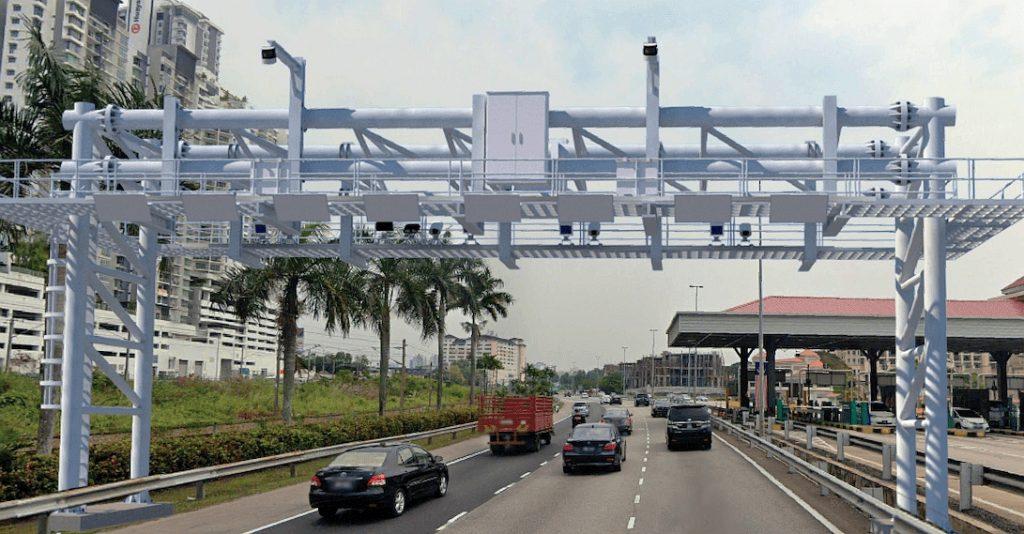In a groundbreaking move, Indonesia is on the brink of revolutionizing toll payment systems, bidding farewell to traditional toll cards. The Multi Lane Free Flow (MLFF) technology, touted as the first in ASEAN, is set to replace toll cards by 2024. Let’s delve into the key developments.
Overview of MLFF Technology

At the heart of the Multi Lane Free Flow (MLFF) technology lies the integration of the Global Navigation Satellite System (GNSS), a cutting-edge navigation system transforming traditional toll transactions. GNSS enables precise vehicle positioning and navigation, eliminating the need for physical toll cards and enabling a frictionless payment experience. Vehicles equipped with in-vehicle GNSS devices seamlessly pass through toll gates without stopping, enhancing traffic flow and reducing travel time.
A standout feature of MLFF is its user-friendly approach, integrating with smartphone applications to empower drivers with transaction management capabilities and real-time updates. This digital integration aligns with the global trend of digitalizing payment systems. Originating from Europe, where GNSS-based toll collection systems have seen widespread success, MLFF represents a significant stride in modernizing toll infrastructure. Beyond toll collection, the potential applications of GNSS technology hint at a broader technological integration, indicating MLFF’s transformative impact may extend far beyond its initial purpose.
In essence, MLFF’s utilization of GNSS technology not only streamlines toll transactions but also sets the stage for a future where touchless, technology-driven experiences redefine how we interact with and navigate transportation infrastructure. The integration of GNSS positions MLFF as a technological trailblazer in the evolution of toll collection systems.
Comparative Analysis with ASEAN Neighbors
Indonesia’s stride into Multi Lane Free Flow (MLFF) technology positions the nation as a frontrunner in Southeast Asia, outpacing developments in neighboring Malaysia and Singapore. While Indonesia collaborates with PT Roatex Indonesia Toll System (RITS) to pioneer MLFF, Malaysia adopts a similar system using Radio-Frequency Identification (RFID). Singapore, on the other hand, is gearing up to implement MLFF with the Global Navigation Satellite System (GNSS) shortly.
The comparative analysis underscores Indonesia’s proactive approach in embracing touchless toll systems. As Indonesia emerges as the first ASEAN country to implement MLFF, it showcases the nation’s commitment to technological innovation in toll collection. The collaboration with a Hungarian subsidiary and the integration of GNSS technology underscore Indonesia’s strategic positioning in the region.
Bali Mandara Toll Gate’s MLFF Pioneer Run on December 12, 2023
The Ministry of Public Works and Public Housing (PUPR) in Indonesia is meticulously orchestrating the implementation plans and trials for the groundbreaking Multi Lane Free Flow (MLFF) technology. As of the latest announcement by Minister Basuki Hadimuljono, the trial run is set to commence on the Bali-Madura toll road, with the initiation date scheduled for December 12, 2023.
This strategic trial will focus on a singular gate at the Bali Mandara Toll, providing a real-world scenario to evaluate the efficacy of MLFF. Minister Basuki remains resolute in pushing forward with the trial, even in close proximity to the groundbreaking of the third investment phase in the Capital of the Archipelago (IKN), slated for December 13-14, 2023.
Should the trial prove successful, the PUPR envisions the gradual adoption of MLFF across all toll gates on the Bali Mandara route by March 2024. The two-week trial period will be followed by a meticulous evaluation at the end of December 2023, serving as a crucial barometer for the future nationwide implementation of MLFF in Indonesia.
The Road Ahead: Expansion and Challenges
As Indonesia ventures into the touchless toll payment frontier with Multi Lane Free Flow (MLFF), a comprehensive roadmap for expansion and addressing potential challenges comes into focus. Minister Basuki Hadimuljono emphasizes a phased approach, marking December 12, 2023, as the initiation of MLFF trials at the Bali Mandara Toll. The subsequent two-week trial period will be followed by a rigorous evaluation, serving as the linchpin for broader implementation. Despite the proximity to the IKN groundbreaking, Minister Basuki remains optimistic about the concurrent events, emphasizing the significance of the MLFF trial in reshaping Indonesia’s toll collection landscape.
Looking beyond the trial phase, Director-General Hedy Rahadian outlines ambitious expansion plans. Post-evaluation, MLFF aims to extend its touchless capabilities to six additional routes across Java. This strategic vision underscores Indonesia’s commitment to innovation, leveraging tangible trial results to pave the way for a nationwide MLFF adoption. However, this promising trajectory is not without its challenges. Minister Basuki acknowledges the importance of synchronizing technological readiness with regulatory frameworks, highlighting a potential hurdle. Striking this balance will be paramount to ensure a seamless transition and the long-term success of MLFF technology in Indonesia. The strategic navigation of challenges in tandem with expansive plans signals a forward-thinking approach to revolutionizing toll systems in the nation.
Thoughts on the Issue
Indonesia’s embrace of MLFF technology signifies a pivotal moment in modernizing transportation infrastructure. The phased approach, coupled with proactive trials and evaluations, showcases a commitment to ensuring a smooth transition. As the nation pioneers touchless toll payments, the challenge lies in harmonizing technology with regulations, a balance crucial for sustained success. Indonesia’s forward-looking stance positions it at the forefront of regional innovation in toll collection systems, promising a more efficient and convenient future for road travelers.















Add a comment